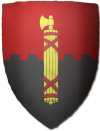The Former County of Caerwent
Caerwent
| County | |
| Information | |
|---|---|
| Continent: | Britain |
| Country: | Anglia |
| Dominant lord: | N/A |
| Heir to dominant lord: | N/A |
| Sheriff: | N/A |
| Military power: | |
| Political power: | |
| Attitude: | |
| Regional stats | |
| Traits: | Vengeful of Saxons |
| Passions: | Vengeful of (Saxons) |
| Coat-of-Arms | |
| Per fess embattled gules and sable, a fasces in pale or banded of the first, the axe or. | |

| |
Caerwent is a county in the kingdom of Anglia.
Caerwent is a former roman province. It once belonged to the mighty and rich Duke of the Saxon Shore together with the county Caerwent. The line has since died out, seemingly without any heir. The land is controlled by the old Dukes aunt, Lady Pomponia. There are many strange rumours of what goes on in her castles. The peasants are suffering the Saxon raids.
Caercolun and Caerwent gets their name from King Coel, who once was said to rule Britain. In the stories Coel grows upset with Asclepiodotus’s handling of the Diocletianic Persecution and begins a rebellion in his duchy of Caer Colun He meets Asclepiodotus in battle and kills him, thus taking the kingship of Britain upon himself. Rome, apparently, is pleased that Britain has a new king, and sends senator Constantius to negotiate with him. Afraid of the Romans, Coel meets Constantius and agrees to pay tribute and submit to Roman laws as long as he is allowed to retain the kingship. Constantius agrees to these terms, but Coel dies one month later. Constantius marries Coel’s daughter, Helena, and crowns himself as Coel’s successor. Helena subsequently gives birth to a son who becomes the Emperor Constantine the Great, giving a British pedigree to the Roman imperial line.